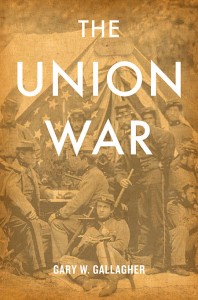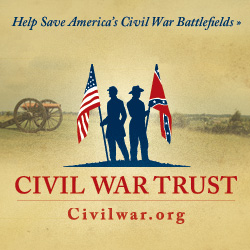 I’ve been corresponding with a prominent American Civil War historian as I finished my master’s Thesis (which I just submitted) about the future of “soldier studies.” The discussion centered on the “military” historian and that perhaps we were witnessing an “eclipse” in the field; there does not seem to be that excitement for Civil War military history that there once was. With regard to social historical aspects and in particular the soldier, the future of the genre seems just as in doubt as the political and military fields of study.
I’ve been corresponding with a prominent American Civil War historian as I finished my master’s Thesis (which I just submitted) about the future of “soldier studies.” The discussion centered on the “military” historian and that perhaps we were witnessing an “eclipse” in the field; there does not seem to be that excitement for Civil War military history that there once was. With regard to social historical aspects and in particular the soldier, the future of the genre seems just as in doubt as the political and military fields of study.
Then comes Gary W. Gallagher’s The Union War, which I think could stimulate the study of Civil War soldiers. Gallagher’s book, if anything, has already stirred the pot a bit. Gallagher’s thesis centers on what motivated Northern soldiers to enlist and fight in a prolonged and bloody war? His conclusion was that the root motivation was primarily the preservation of the Union. As Gallagher contends in the very first sentence of his Introduction, “The loyal American citizenry fought a war for Union that also killed slavery.” Though not revolutionary or groundbreaking stuff, Gallagher’s study is a shot across the bow of the assumption that the average Northern Civil War soldier could not have fought for some “abstract” concept as “Union.”
 Indeed in a recent (April of 2011) broadcast of Backstory “Civil War 150th: Why They Fought,” Gallagher was interviewed and taken to task somewhat. One of the program’s hosts Brian Balogh stated to Gallagher: “And I just can’t understand how all these men could fight and many of them die for something as abstract as Union. Can you explain to our listeners what Union meant to these men?” [Transcript]
Indeed in a recent (April of 2011) broadcast of Backstory “Civil War 150th: Why They Fought,” Gallagher was interviewed and taken to task somewhat. One of the program’s hosts Brian Balogh stated to Gallagher: “And I just can’t understand how all these men could fight and many of them die for something as abstract as Union. Can you explain to our listeners what Union meant to these men?” [Transcript]
To which Gallagher responded:
I think what Union meant at the absolutely base for the mass of white Northerners was it meant a small “d” democratic republican system that gave a common person a voice in his own government—men are voting. Only men are voting. We know that—in his own government and it provided economic opportunity, not a guarantee for economic success, but much greater economic opportunity than any aristocratic or oligarchic society had and that was something that they treasured and they had imbibed Daniel Webster’s great rhetoric. It’s everywhere. It shows up in advertisements—Liberty and Union, Liberty and Union, and what they meant by liberty is not what we would normally think about. Liberty is often tied now to your attitude toward slavery. That is not how they would’ve deployed that word for the most part. Liberty for them meant freedom to enjoy these political rights and a chance to move ahead in an economic sense.
I think herein lies a key topic of debate among Civil War historians. What was more abstract to a Northern soldier? Concepts of “emancipation” and “slavery,” or “Union” and the “Constitution.” It seems Gallagher has a legitimate claim.
However, all is not well as Gallagher does take some of his comrades in the American historical field to task, and the response has been swift and sure.
In particular Gallagher questioned the historian’s use of soldier correspondences. As there are literally tens of thousands (maybe more) available, and many more being discovered every week, thus there is no way in Gallagher’s mind to find a “truly representative sample” and therefore the scholarship is hopelessly flawed. When using these documents a historian has to be what Gallagher calls “impressionistic” in their evaluation. I have discussed this “quantitative” nature of historical assessment in the past and it indeed can lead to issues. As Gallagher contends, any historian can find enough data to support almost any claim.
What is interesting is Gallagher takes to task historians such as Chandra Manning for such their “impressionistic” samplings, and then himself seems to do just that to prove his points. For example, he questioned Manning’s sample for being too limited in number. Though he ignores her use of over 100 regimental newspapers, when Gallagher himself highlights his use of regimental histories of the late 19th Century to support his thesis — are those unit histories somehow more representative as a group production? Clearly a regimental newspaper would have been just as reflective as to what a regiment believed or thought! Gallagher uses 350 regimental histories, though more than Manning’s newspapers, it certainly is not significantly more to prove his point. Gallagher though is also simply warning that soldier correspondences alone must be balanced with other sources. He also uses patriotic letter envelopes and stationary that were produced during the time period as evidence, which I thought was interesting!
My hope is that Gallagher’s book expands the discussion to once again include those patriotic and “exceptionalism” aspects of motivation for Northern soldiers. Certainly we must continue to discuss the role of race and slavery, but it is not the be all or end all.




Pingback:The Union War as Expressed by Civil War Patriotic Letter Envelopes | Civil War Voices
Pingback:Follow up to Patriotic Postage Envelopes & Civil War Paper Soldiers Collection | Civil War Voices